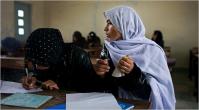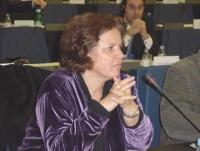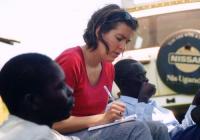 Despite threats and an acid attack on several students two months ago, the Mirwais School for Girls is thriving.
Despite threats and an acid attack on several students two months ago, the Mirwais School for Girls is thriving.
The acid attack against students and teachers (15 of them in total) was meant to terrorize the girls into staying home. It appears to have completely failed.
Today, nearly all of the wounded girls are back at the Mirwais School for Girls, including one whose face was so badly burned that she had to be sent abroad for treatment. Perhaps even more remarkable, nearly every other female student in this deeply conservative community has returned as well — about 1,300 in all.
(Susan notes: the full New York Times story is wonderful; highly recommended)
2009-01-28
Posted in Women In the News
Susan notes: almost two years later, on June 1, 2010, the message in this letter is more relevant than ever...
Message from
Dr. Nurit Peled-Elhanan, Israeli peace activist and co-laureate of the 2001
Sakharov Prize for Freedom of Thought (shared with Izzat Ghazzawi), to Mr Hans Gert Pöttering, President of the
European Parliament; Luisa Morgantini, Vice President of the European
Parliament; and the Sakharov Prize winners on the occasion in December
2008 of the 20th
Anniversary of the Sakharov Prize for Freedom of Thought. See also
Extra Left, and
We Are All Victims of the Occupation.
2009-01-12
Posted in Women In the News
This article is based on an interview with Dr. Nurit Peled Elhanan,
Israeli peace activist, lecturer at Hebrew University, and mother of
13-year-old daughter Smadari Elhanan who was killed 11 years ago by a
Palestinian suicide bomber.
The interview and article, by Yuval Hyman, were prompted by a letter
written by Dr. Peled Elhanan to the European Parliament on the occasion
of the the 20th anniversary of the Sakharov Prize for Freedom of Thought, which she shared with fellow peace activist and Palestinian writer Izzat Ghazzawi in 2001.
The article was originally published in the Israeli newspaper Maariv,
on January 2, 2009. The English translation by George Malent was
supplied to AWR by Dr. Peled Elhanan. See also"We Are All Victims of the Occupation," a 2007 article written by Dr. Peled Elhanan,
2009-01-12
Posted in Women In the News
Excerpt from "Extra Left," an article based on an interview with Dr. Nurit Peled Elhanan, Israeli peace activist, lecturer at Hebrew University, and mother of 13-year-old daughter Smadari Elhanan who was killed 11 years ago by a Palestinian suicide bomber.
 "...We have appropriated all the beautiful things about that (the Palestinian) culture. Why is it impossible to live together? If there are two cultures it is impossible to live together? If there is equality of civil rights, there will be no conflict.”
"...We have appropriated all the beautiful things about that (the Palestinian) culture. Why is it impossible to live together? If there are two cultures it is impossible to live together? If there is equality of civil rights, there will be no conflict.”
"...No one is doing a thing to save the children and to give the people a good life, so they can live as neighbours, in happiness. So there can be life with mutual respect and mutual learning and mutual acceptance and good education, and there’s no people like the Palestinians for investing in the education of their children. There’s no people like them. You know, that in Gaza the literacy rate is among the highest in the world, 92 percent, with all that we are doing to them? They are wonderful people, charming people. It’s all racism, it is all in a context of racism.”
The interview and article, by Yuval Hyman, were prompted by a letter written by Dr. Peled Elhanan to the European Parliament on the occasion of the the 20th anniversary of the Sakharov Prize for Freedom of Thought, which she shared with fellow peace activist and Palestinian writer Izzat Ghazzawi in 2001.
The article was originally published in the Israeli newspaper Maariv, on January 2, 2009. The English translation by George Malent was supplied to AWR by Dr. Peled Elhanan. See the full English text of the Maariv article.
2009-01-12
Posted in Women In the News
Excerpt from an article by Canadian journalist Stephanie Nolen, who recently moved to India after being posted for several years in South Africa.
Men stare at me incessantly, with an assessing curiosity that is not friendly. Young men follow me in the street, even when I am carrying my young son. When I'm alone, they call out to me, or make sucking noises. In India, it's known by the dismissive term “Eve teasing” – it's pervasive, unrelenting sexual harassment by strangers.

I don't yet know whether I get more of it, as a visible foreigner, or less than an Indian woman would get in similar situations, but it's alienating and unpleasant regardless. New friends here tell me it can, if you're unlucky and caught alone, easily escalate from harassment to assault. One foreign journalist colleague, walking with her male colleague, also a foreigner, was recently set upon – at noon in a crowded market – by young men who groped her so aggressively, she had to run away and, a week later, had livid, purple bruises from the “fondling.”
Sub-Saharan Africa, of course, is no bastion of gender equality – I covered horrific incidents of mass rape, child marriage and female genital mutilation. Yet somehow I am reminded more incessantly of the sexism here. It started when I signed our lease, and had to provide either my father's name or my husband's. I've had to adjust to the fact that every repair person, shopkeeper and many potential staff members utterly ignore anything I say to them, waiting for the voice of authority, my male partner, to tell them what they really ought to do.
STEPHANIE NOLEN
Globe and Mail (Canada)
2009-01-11
Posted in Women In the News
 Despite threats and an acid attack on several students two months ago, the Mirwais School for Girls is thriving.
Despite threats and an acid attack on several students two months ago, the Mirwais School for Girls is thriving. "...We have appropriated all the beautiful things about that (the Palestinian) culture. Why is it impossible to live together? If there are two cultures it is impossible to live together? If there is equality of civil rights, there will be no conflict.”
"...We have appropriated all the beautiful things about that (the Palestinian) culture. Why is it impossible to live together? If there are two cultures it is impossible to live together? If there is equality of civil rights, there will be no conflict.” I don't yet know whether I get more of it, as a visible foreigner, or less than an Indian woman would get in similar situations, but it's alienating and unpleasant regardless. New friends here tell me it can, if you're unlucky and caught alone, easily escalate from harassment to assault. One foreign journalist colleague, walking with her male colleague, also a foreigner, was recently set upon – at noon in a crowded market – by young men who groped her so aggressively, she had to run away and, a week later, had livid, purple bruises from the “fondling.”
I don't yet know whether I get more of it, as a visible foreigner, or less than an Indian woman would get in similar situations, but it's alienating and unpleasant regardless. New friends here tell me it can, if you're unlucky and caught alone, easily escalate from harassment to assault. One foreign journalist colleague, walking with her male colleague, also a foreigner, was recently set upon – at noon in a crowded market – by young men who groped her so aggressively, she had to run away and, a week later, had livid, purple bruises from the “fondling.”